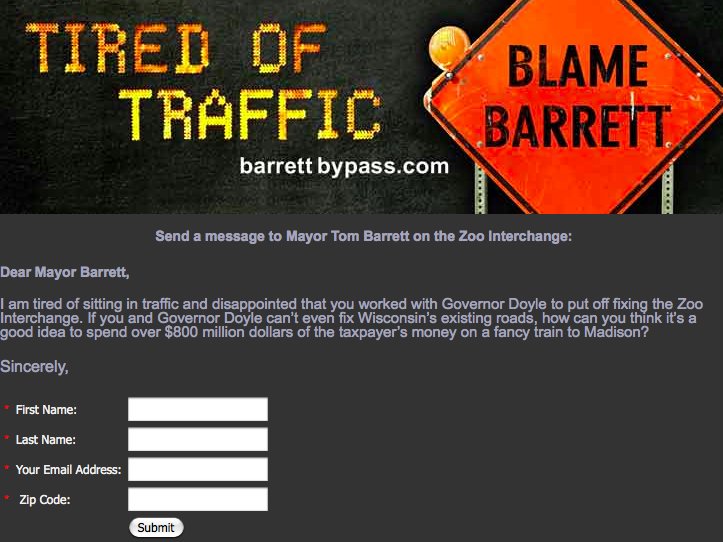Some Milwaukee aldermen are still smarting over Mayor Tom Barrett's end-run to get $597,000 to pay for 20 surveillance cameras for high-crime neighborhoods.
A Common Council committee rejected Barrett's request for the money this summer after complaining that Barrett's office had misled aldermen on how much the cameras would cost.
Barrett responded by unilaterally shifting money from the police and public works budget to pay for the pole-mounted cameras, which did not need the council's approval.
An attempt by aldermen to block the money shift failed. The federal government chipped in some $400,000 for the cameras as well.
At a Finance Committee meeting this week considering the 2008 city budget, Ald. Mike D'Amato tried to take $250,000 slated for staff to watch camera monitors and put it towards hiring more cops on the street.
"This was ill-advised ... back-doored and sidewaysed in," he said of the cameras. "It's time to cut bait."
D'Amato reiterated arguments that the cameras don't reduce crime, but move it to areas without surveillance. "Criminals aren't stupid."
He added that promised payroll savings from the cameras was overrated and that overall police staffing philosophy needs to change.
"If we continue to do things the same way we will continue to do things the same way," he said, alluding to ideas that police aides could just as well be used for tasks that uniformed cops are now doing instead of being on the street. "These amendments offer a fundamental change in how we police."
His idea failed in a 1-4 committee vote, however a similar proposal by Ald. Jim Bohl to eliminate nine monitor watchers was approved, with the savings going into the general budget and not to the Police Department.
"We just spent a million dollars for nothing," offered Ald. Michael Murphy, a supporter of the cameras, noting that there would be cameras but no one to watch what was going on. More amendments will be made at the Common Council meeting Nov. 9.
Easy Money: The law offices of Eggert & Cermele, headed by Milwaukee attorney Laurie Eggert, makes a practice of representing Milwaukee police officers being accused in citizen complaints.
A bill from the firm being considered by a Common Council committee next week is $23,908.75. In a case where attorney Jonathan Cermele billed the city for $2,110.50 for representing four notorious cops, the resulting dismissal of the complaint by the Fire and Police Commission actually had nothing to do with the firm's legal prowess -- the plaintiff in the case happened to be in jail after being arrested on a bail-jumping charge and couldn't make it to testify against the cops.
Talk about convenient timing.
The case stems from a police battery complaint from Draylon Oliver, who accused officers Joseph Warren, Paul Lough, Dean Newport and Michael Lutz of beating him during a 2003.
The four may be familiar to those who follow police brutality accusations. In 2004, Charles Michael Griffin -- a soldier on leave from Iraq -- named Warren and Lough in complaint for using excessive force. Griffin claimed he suffered multiple bruises and a broken shoulder after an altercation with Warren, Lough and two other detectives.
In 2003, Lutz and Newport were involved in the controversial shooting of Timothy Nabors. Lutz shot Nabors, then claimed Nabors had picked up a gun that was slid across the pavement to him by another suspect. Some witnesses in the case said Nabors never even picked up the gun. The fall-out in the case had rippled into the mayor's race at the time.
Part of the crew that Eggert's firm represented in the Oliver case was former officer Ala Awadallah, who pleaded guilty to federal charges of depriving citizens their civil rights in a separate case when Awadallah was taped threatening to plant drugs on a collar. He was dropped from the case after his federal plea.
Per routine accounting procedures, the firm submitted a detailed list of itemized costs at $110 per hour prior to Oliver missing the hearing. The City Attorney's office recommended payment of the amount. "The time spent was reasonable," writes City Attorney Grant Langley.
Aldermen in the past have not raised questions over the Eggert firm's billing, but have made an issue over how much outside representation of accused cops is costing the city.
The city has appealed to the Supreme Court, and a nationwide effort by the Legal Community Against Violence is coordinating an effort to get other cities to sign on with D.C. in its appeal to the Supreme Court. In Milwaukee, Ald. Ashanti Hamilton is sponsoring a resolution to have the city sign onto the case as a friend of D.C.
"Municipalities have a particular interest and stake in the outcome of the case as the Supreme Court's decision has the potential to impact the ability of local governments to enact ordinances addressing issues of local concern, including community safety, youth violence, gang activity and access to illegal weapons," reads the resolution.
In 1994, the City of Milwaukee held a referendum asking residents to vote on whether to ban handguns in our fair city. The measure failed by a wide margin and shortly afterwards, the NRA got the Legislature to pass a law banning local control over gun laws in Wisconsin.
Tavern Tossing Update: Attorney Michael Whitcomb batted 1-for-2 in front of the Milwaukee Common Council Licenses Committee this week in representing tavern owners facing revocation of their licenses for various nasty behaviors.
Whitcomb successfully fought off an organized neighborhood effort to shutdown Tap Whatever, 3716 N. Martin Luther King Jr. Dr., after exposing the "eye-witnesses" to a shooting as not living near the bar.
One woman said she filed a complaint against the bar based on what she was told by other neighbors, which is a no-no since it's also known as heresy. Tap Whatever survived to stay open another day, but the committee gave the opposition organizers another shot at making their case, giving them time to amend their complaints and get their stories straight.
Whitcomb also represented the Camelot Show Lounge, 2714 S. 13th St., after Ald. Tony Zielinski filed a formal revocation complaint because the lounge's dancers were showing more skin and body parts than the law permits and for dancers being prostitutes on the side.
Instead of putting his business at the mercy of the committee -- and facing a permanent revocation -- owner Terry Cullen voluntarily surrendered his license. It allows the Camelot to perhaps live another day since revocation would have been permanent. It also gives Cullen time to recruit a higher class of dancers instead of relying on call girls.
Zielinski also put another tavern license on the revocation block this week, Chaser's Pub, at 2155 S. Kinnickinnic Ave. Chaser's had become known as a great place for cocaine and had a litany of busts for patrons selling crack to other customers. The final blow for Zielinski was when a bartender was busted for selling coke to a cop after telling the officer that "customers would ask for cocaine and she would go into the bathroom and get it for them," according to the police report.
Chaser's owner Frank Dobert promised the committee that he was going to move into the house behind the bar to keep a better eye on the bar's action. The committee gave him the benefit of the doubt and instead of yanking the license altogether, it voted to suspend the license for 30 days. The suspension begins if the Common Council approves the deal at its next meeting, Nov. 9.
An avid outdoors person he regularly takes extended paddling trips in the wilderness, preferring the hinterlands of northern Canada and Alaska. After a bet with a bunch of sailors, he paddled across Lake Michigan in a canoe.
He lives in Bay View.







